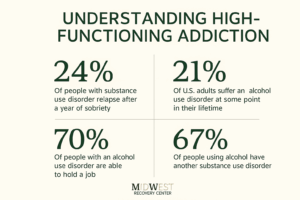I wasn’t living out of my car. I wasn’t waking up in strange places. I wasn’t missing work or blowing up my family. From the outside, life looked…fine. Steady. Even successful. But inside? I was burning out—fast. The days were getting harder to fake, the nights harder to escape, and the weight of pretending was becoming unbearable. That’s when I finally stopped moving the goalposts and admitted I needed help. Midwest Recovery’s intensive outpatient program in Toledo didn’t just give me back my life—it gave me back myself.
The Invisible Struggle of High-Functioning Addiction
It’s a strange place to be. You’re the one who holds it together. The one people rely on. Maybe you’re managing a career, raising a family, or leading a team—yet inside, something is breaking down. That was me.
I told myself I didn’t need help because everything looked fine. My paycheck still cleared. My calendar was packed. My friends didn’t seem to notice. But I noticed. I felt the growing panic under the surface, the isolation of carrying a secret, the exhaustion of keeping up appearances. High-functioning doesn’t mean healthy. IOP taught me that distinction—and it was the first step to real freedom.
Intensive Outpatient Program: Help Without Blowing Up Your Life
I used to think you had to hit bottom to go to treatment. That you had to fall apart publicly, lose everything, and only then qualify for help. That myth kept me stuck for years. What I didn’t realize was there’s a middle ground—a way to heal while keeping your life intact.
That’s what an intensive outpatient program (IOP) gave me. At Midwest Recovery, I kept my job, stayed present for my family, and got real, structured help several evenings a week. I didn’t have to explain gaps in my resume or disappear from my responsibilities. I could stay in my life while changing it.
Signs You Might Be High-Functioning but Still Need Help
Looking back, the signs were there for a while—I just got good at ignoring them. If any of these sound familiar, it’s worth asking yourself some honest questions:
- You feel emotionally drained but tell yourself you’re just stressed
- You rely on alcohol, pills, or other substances to “unwind” almost daily
- Your nights are becoming a blur, but you show up the next day like nothing happened
- Anxiety, irritability, or depression are creeping in more frequently
- You tell yourself, “It’s not that bad” while quietly wondering if it is
IOP wasn’t a punishment for me—it was a release. It was finally saying, “I’m allowed to feel okay again.”
The Freedom of Finally Talking About It
Walking into my first group therapy session, I was nervous. I thought everyone would be different from me. Worse off. More “obvious.” What I found was a room full of people who looked just like me. People with jobs, families, responsibilities… and secrets. There was no judgment. No hierarchy of suffering. Just people finally saying out loud the things we’d kept locked inside for too long.
That’s when I felt something I hadn’t felt in years—relief. I wasn’t alone. I wasn’t broken beyond repair. I was just human. And I deserved help.
What Does an Intensive Outpatient Program Actually Look Like?
If you’ve never been to treatment, IOP can sound like a mystery. Here’s what it looked like for me:
- Three to five days a week of structured support
- Group therapy focused on real-world coping skills, emotional awareness, and practical strategies
- Individual therapy for personal breakthroughs and deeper work
- Flexible scheduling so I could attend after work and on weekends
- Skills I could use right away—not just in recovery, but in life
It wasn’t about sitting in a room talking about my feelings all day. It was about learning why I’d been stuck in patterns and how to break them without destroying my life in the process.
IOP Gave Me My Edge Back—Without the Crash
One thing I was terrified of? Losing my ambition. I worried that sobriety would make me dull, that without substances I’d lose my drive. The truth? I got sharper. I became more focused, less reactive, more creative. I stopped spending my mornings battling hangovers and my nights chasing relief. I got my edge back—without sacrificing my sanity.
Midwest Recovery’s intensive outpatient program in Toledo didn’t just help me stay afloat; it helped me rise.
You Don’t Have to Be in Crisis to Deserve Help
One of the biggest lies I told myself was, “It’s not that bad yet.” I waited for things to get worse before admitting they were already bad enough. You don’t have to crash and burn to make a change. You don’t need a DUI, a pink slip, or a destroyed relationship to start healing. You just need to be tired of feeling this way. That’s enough. You are enough.
Frequently Asked Questions About Intensive Outpatient Programs
Is an intensive outpatient program right for me if I have a full-time job?
Yes. IOP is specifically designed for people who need help while maintaining their daily responsibilities. Sessions often happen in the evenings or weekends to accommodate work schedules.
How is IOP different from inpatient rehab?
Inpatient rehab involves living at a facility full-time, often for 30 days or more. IOP lets you live at home, go to work, and attend structured therapy sessions several times a week. It’s more flexible but still intensive.
Do I have to call myself an addict to go to IOP?
No. Labels aren’t required. If you’re struggling—whether you call it addiction, burnout, or just “not okay”—IOP can help. The focus is on healing, not labeling.
Can IOP really help if I haven’t “hit bottom”?
Absolutely. In fact, IOP is most effective when you get help before things spiral out of control. It’s about reclaiming your life early, not waiting for it to collapse.
What if I’m not sure my drinking or use is a problem?
That uncertainty is common—especially for high-functioning people. IOP can help you explore your relationship with substances and give you tools to make healthier choices, whether you decide on full sobriety or moderation.
If any part of this hits home, don’t wait for things to get worse. Call (888) 657-0858, You don’t have to lose everything to start feeling better—you just have to want more for yourself.









